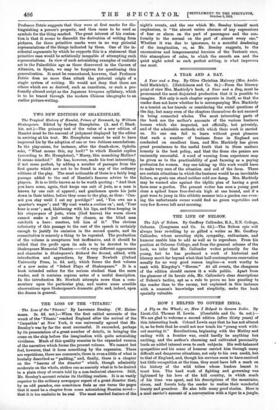TWO NEW EDITIONS OF SHAKESPEARE.
The Tragical History of Hamlet, Prince of Denmark, by William Shakespeare. Edited by Sydney Humphries. (A. and C. Black. 108. net.)—The primary test of the value of a new edition of Hamlet must be the amount of judgment displayed by the editor in arriving at his text. Mr. Humphries cannot be said to have improved his by the adoption of one or two dubious emendations. In the play-scene, for instance, after the dumb-show, Ophelia asks, " What means this, my lord? " to which Hamlet replies (according to Mr. Humphries), " Marry, this munching Manioc.? It means mischief." He has, however, made his text interesting, if not more perfect, by adding a number of passages from the first quarto which are not to be found in any of the ordinary editions of the play. The most noticeable of these is a fairly long passage added to the end of Hamlet's famous advice to the players. It is so little known as to be worth quoting : "And then you have some, again, that keeps one suit of jests, as a man is known by one snit of apparel ; and gentlemen quote his jests down in their tables, before they come to the play, as thus : 'Can- not you stay until I eat my porridge ?' and, ' You owe me a quarter's wages' ; and 'My coat wants a coulisse on'; and, 'Your beer is sour ' ; and, blabbering with his lips, and thus keeping in his Cinque pace of jests, when (God knows) the warm clown cannot make a jest unless by chance, as the blind man catcheth a hare: masters, tell him of it." The obvious inferiority of this passage to the rest of the speech is certainly enough to justify its omission in the second quarto, and its resuscitation is scarcely a thing to be repeated. The production of the volume is sumptuous but inoffensive, and it should be added that the profit upon its sale is to be devoted to the Shakespeare Memorial Theatre.—Of a very different appearance and character is Shakespeare's Richard the Second, edited, with introduction and appendixes, by Henry Newbolt (Oxford University Press, ls. 6d. net), which forms the first volume of a new series of "Select Plays of Shakespeare." It is a book intended rather for the serious student than the mere reader, and it contains copious notes of a useful description. In the introduction Mr. Newbolt attempts more than a com- mentary upon the particular play, and makes some sensible observations upon Shakespeare's dramatic gifts and, indeed, upon the drama in general.


































































 Previous page
Previous page